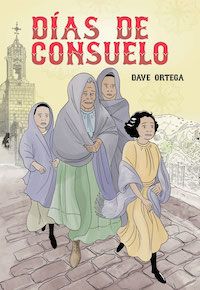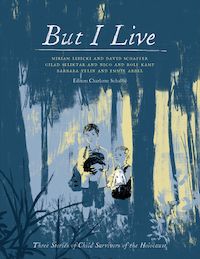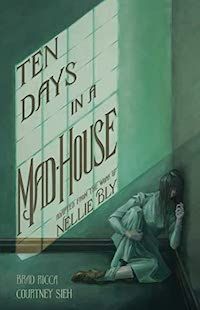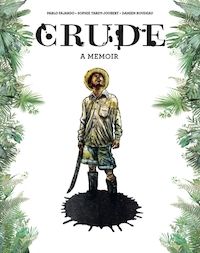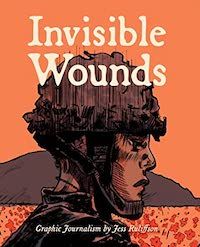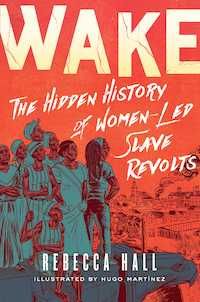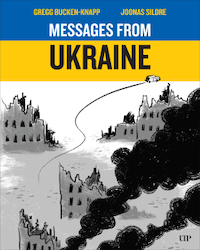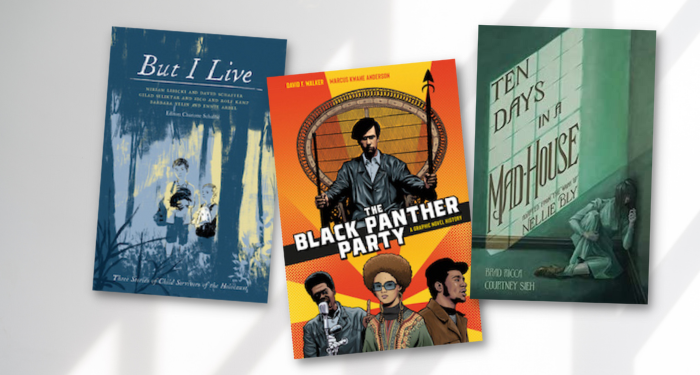
This content contains affiliate links. When you buy through these links, we may earn an affiliate commission.
Elisa Shoenberger (she/her) is a writer in Chicago. She has been published in the Slate, Boston Globe, Huffington Post, and many others. She also has written about books for Murder & Mayhem, Earth Island Journal, Broad Street Review, Chicago Reader, and others. She is also the co-founder and co-editor of The Antelope, a journal of oral history and mayhem. She tweets at @vogontroubadour and her work can be found here.
View All posts by Elisa Shoenberger
Elisa Shoenberger (she/her) is a writer in Chicago. She has been published in the Slate, Boston Globe, Huffington Post, and many others. She also has written about books for Murder & Mayhem, Earth Island Journal, Broad Street Review, Chicago Reader, and others. She is also the co-founder and co-editor of The Antelope, a journal of oral history and mayhem. She tweets at @vogontroubadour and her work can be found here.
View All posts by Elisa Shoenberger
Elisa Shoenberger (she/her) is a writer in Chicago. She has been published in the Slate, Boston Globe, Huffington Post, and many others. She also has written about books for Murder & Mayhem, Earth Island Journal, Broad Street Review, Chicago Reader, and others. She is also the co-founder and co-editor of The Antelope, a journal of oral history and mayhem. She tweets at @vogontroubadour and her work can be found here.
View All posts by Elisa Shoenberger
Elisa Shoenberger (she/her) is a writer in Chicago. She has been published in the Slate, Boston Globe, Huffington Post, and many others. She also has written about books for Murder & Mayhem, Earth Island Journal, Broad Street Review, Chicago Reader, and others. She is also the co-founder and co-editor of The Antelope, a journal of oral history and mayhem. She tweets at @vogontroubadour and her work can be found here.
View All posts by Elisa Shoenberger
Elisa Shoenberger (she/her) is a writer in Chicago. She has been published in the Slate, Boston Globe, Huffington Post, and many others. She also has written about books for Murder & Mayhem, Earth Island Journal, Broad Street Review, Chicago Reader, and others. She is also the co-founder and co-editor of The Antelope, a journal of oral history and mayhem. She tweets at @vogontroubadour and her work can be found here.
View All posts by Elisa Shoenberger
Elisa Shoenberger (she/her) is a writer in Chicago. She has been published in the Slate, Boston Globe, Huffington Post, and many others. She also has written about books for Murder & Mayhem, Earth Island Journal, Broad Street Review, Chicago Reader, and others. She is also the co-founder and co-editor of The Antelope, a journal of oral history and mayhem. She tweets at @vogontroubadour and her work can be found here.
View All posts by Elisa Shoenberger
Elisa Shoenberger (she/her) is a writer in Chicago. She has been published in the Slate, Boston Globe, Huffington Post, and many others. She also has written about books for Murder & Mayhem, Earth Island Journal, Broad Street Review, Chicago Reader, and others. She is also the co-founder and co-editor of The Antelope, a journal of oral history and mayhem. She tweets at @vogontroubadour and her work can be found here.
View All posts by Elisa Shoenberger
Elisa Shoenberger (she/her) is a writer in Chicago. She has been published in the Slate, Boston Globe, Huffington Post, and many others. She also has written about books for Murder & Mayhem, Earth Island Journal, Broad Street Review, Chicago Reader, and others. She is also the co-founder and co-editor of The Antelope, a journal of oral history and mayhem. She tweets at @vogontroubadour and her work can be found here.
View All posts by Elisa Shoenberger
Elisa Shoenberger (she/her) is a writer in Chicago. She has been published in the Slate, Boston Globe, Huffington Post, and many others. She also has written about books for Murder & Mayhem, Earth Island Journal, Broad Street Review, Chicago Reader, and others. She is also the co-founder and co-editor of The Antelope, a journal of oral history and mayhem. She tweets at @vogontroubadour and her work can be found here.
View All posts by Elisa Shoenberger
Elisa Shoenberger (she/her) is a writer in Chicago. She has been published in the Slate, Boston Globe, Huffington Post, and many others. She also has written about books for Murder & Mayhem, Earth Island Journal, Broad Street Review, Chicago Reader, and others. She is also the co-founder and co-editor of The Antelope, a journal of oral history and mayhem. She tweets at @vogontroubadour and her work can be found here.
View All posts by Elisa Shoenberger
Elisa Shoenberger (she/her) is a writer in Chicago. She has been published in the Slate, Boston Globe, Huffington Post, and many others. She also has written about books for Murder & Mayhem, Earth Island Journal, Broad Street Review, Chicago Reader, and others. She is also the co-founder and co-editor of The Antelope, a journal of oral history and mayhem. She tweets at @vogontroubadour and her work can be found here.
View All posts by Elisa Shoenberger
Elisa Shoenberger (she/her) is a writer in Chicago. She has been published in the Slate, Boston Globe, Huffington Post, and many others. She also has written about books for Murder & Mayhem, Earth Island Journal, Broad Street Review, Chicago Reader, and others. She is also the co-founder and co-editor of The Antelope, a journal of oral history and mayhem. She tweets at @vogontroubadour and her work can be found here.
View All posts by Elisa Shoenberger
Reading Art Spieglman’s Maus was a revelation. While I had read many novels and memoirs of the Holocaust, his book made the horrors even more tangible. Pictures really are worth a thousand words. But it was also a lesson in craft; here was a book in the realm of comics that was nonfiction with fantastical symbolic elements, using animals as proxies for different ethnic groups in the book.
Before Maus, I hadn’t read a lot of graphic nonfiction — or even known it was a thing. To me, comics were in the newspaper, Archie, or superhero comics. Since then, I’ve been particularly fascinated by the use of comics to explore history, whether the comics focus on a period of history or use it as a window into an era. There’s so much that pictures and text can do together to bring a period of history and its people alive.
Decades later, we’re so fortunate to have so many graphic nonfiction books out on the market, covering a diversity of topics. I’ve put together a list of eight graphic nonfiction books that cover more political topics published in the past few years. Some are in the realm of memoir, while others try to expand on a period of time.
Días de Consuelo by Dave Ortega
In this graphic memoir, Ortega writes about his grandmother’s memories of her life and family growing up in the turbulence brought by the Mexican Revolution. It’s part family history and part history of the Mexican Revolution, with its larger-than-life figures of Pancho Villa and Emiliano Zapata. It’s a story of a family making hard decisions to leave their home in the face of so much violence and uncertainty.
But I Live: Three Stories of Child Survivors of the Holocaust edited by Charlotte Schallié
Just nominated for a 2023 Eisner Award for the Best Reality Based Work, But I Live tells the three stories of four Holocaust survivors from Romania to Holland: David Schaffer, Nico and Rolf Kamp, and Emmie Arbel. These three stories show the diversity of horrors and experiences, tracing survivors’ experiences from hiding from the Nazis to surviving concentration camps. It’s about the resilience and trauma of World War II.
The Stack Newsletter
Sign up to The Stack to receive Book Riot Comic’s best posts, picked for you.
Thank you for signing up! Keep an eye on your inbox.
By signing up you agree to our terms of use 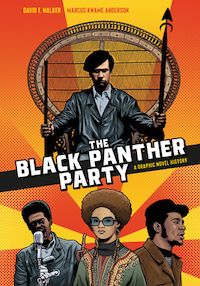
The Black Panther Party: A Graphic Novel History by David F. Walker and Illustrated by Marcus Kwame Anderson
This Eisner-winning book provides an introduction to the history of the Black Panther Party for Self Defense, starting in 1966. It explores the movement’s contributions to America as well as the violence and brutality the Black Panthers faced from law enforcement.
Ten Days in a Mad-House: A Graphic Adaptation by Brad Ricca and Courtney Sieh
In 1887, journalist Nellie Bly published her experiences as a patient at the Women’s Lunatic Asylum on Blackwell Island. To find out the conditions at the asylum, she gets herself committed for 10 days where she learns how horrific the asylum was for the women there, including substandard food, acts of cruelty from staff, and women being committed without cause. Ricca and Sieh have adapted this critical text to bring Bly’s investigation to life and to new readers. It’s a reminder that the fight to improve mental health is not new and has been long fought, but there’s so much further to go.
Crude: A Memoir by Pablo Fajardo, Sophie Tardy-Joubert, and illustrated by Damien Roundeau, translated by Hannah Chute
This is the story of a man’s fight to bring a U.S. oil company to justice for its environmental destruction. When he was younger, Pablo Fajardo worked in the oil fields, seeing firsthand Texaco’s destruction of the environment and the local people. He becomes a lawyer and works as lead counsel for the Union of People Affected by Texaco to get Texaco to remediate the ruined land and pay reparations for the death and destruction that the oil company has wrought.
Invisible Wounds: Interviews with American Vets by Jess Ruliffson
This graphic nonfiction book is based on five years of interviews with veterans from both the Iraq and Afghanistan Wars across the U.S. Ruliffson illustrates the stories of men, women, and nonbinary veterans about their experiences on and off the battlefield. It’s an exploration of the politics and impact of war on the people who fought them.
Wake: The Hidden History of Women-Led Slave Revolts by Rebecca Hall and illustrated by Hugo Martinez
Both a graphic memoir and novel, Wake tells the hidden story of women leading slave revolts on the Middle Passage. Most accounts of revolts fail to mention women, but based on Dr. Hall’s thorough research into documents and physical evidence in the form of bones of enslaved women, she uncovers a rich history of women fighting back on the Middle Passage as well as revolts in Colonial America.
Messages from Ukraine by Gregg Bucken-Knapp and illustrated by Joonas Sildre
Messages provides snapshots of life as Ukrainian professionals deal with the Russian Invasion in February 2022. When he heard of the invasion, Swedish professor Gregg Bucken-Knapp reached out to his Ukrainian colleagues via text. This book is made from their responses, as some leave their homes while others have to stay. It’s an important look at the cost of war on the people of Ukraine.
For more graphic nonfiction, check out this Book Riot list of 10 more graphic nonfiction titles or this list of graphic novels with political themes.


